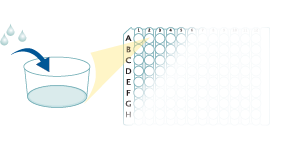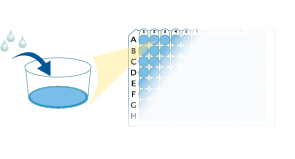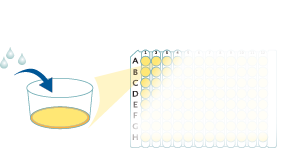Mouse CCL11/Eotaxin Quantikine ELISA Kit Summary
Product Summary
Precision
Cell Culture Supernates, Serum, EDTA Plasma, Citrate Plasma
| Intra-Assay Precision | Inter-Assay Precision | |||||
|---|---|---|---|---|---|---|
| Sample | 1 | 2 | 3 | 1 | 2 | 3 |
| n | 20 | 20 | 20 | 20 | 20 | 20 |
| Mean (pg/mL) | 49 | 197 | 466 | 46 | 179 | 446 |
| Standard Deviation | 3.2 | 7.2 | 30 | 3.8 | 11.7 | 28.7 |
| CV% | 6.5 | 3.7 | 6.4 | 8.3 | 6.5 | 6.4 |
Recovery
The recovery of mouse Eotaxin spiked to three levels throughout the range of the assay in various matrices was evaluated.
| Sample Type | Average % Recovery | Range % |
|---|---|---|
| Cell Culture Supernates (n=6) | 96 | 82-103 |
| Citrate Plasma (n=5) | 97 | 81-114 |
| EDTA Plasma (n=5) | 100 | 83-118 |
| Serum (n=5) | 98 | 82-111 |
Linearity
Scientific Data
Product Datasheets
Preparation and Storage
Background: CCL11/Eotaxin
CCL11/Eotaxin is a chemokine that interacts with CCR3 to induce eosinophil, basophil, dendritic cell, and Th2 cell chemoattraction during inflammatory and allergic reactions. Its production is upregulated in airway epithelium, alveolar macrophages, eosinophils, smooth muscle cells, chondrocytes, and fibroblasts following allergen or inflammatory challenge. CCL11 is also involved in the growth of myeloid cell progenitors and the differentiation of mast cells.
Assay Procedure
Refer to the product- Prepare all reagents, standard dilutions, and samples as directed in the product insert.
- Remove excess microplate strips from the plate frame, return them to the foil pouch containing the desiccant pack, and reseal.
- Add 50 µL of Assay Diluent to each well.
- Add 50 µL of Standard, Control, or sample to each well. Cover with a plate sealer, and incubate at room temperature for 2 hours.
- Aspirate each well and wash, repeating the process 4 times for a total of 5 washes.
- Add 100 µL of Conjugate to each well. Cover with a new plate sealer, and incubate at room temperature for 2 hours.
- Aspirate and wash 5 times.
- Add 100 µL Substrate Solution to each well. Incubate at room temperature for 30 minutes. PROTECT FROM LIGHT.
- Add 100 µL of Stop Solution to each well. Read at 450 nm within 30 minutes. Set wavelength correction to 540 nm or 570 nm.





Citations for Mouse CCL11/Eotaxin Quantikine ELISA Kit
R&D Systems personnel manually curate a database that contains references using R&D Systems products. The data collected includes not only links to publications in PubMed, but also provides information about sample types, species, and experimental conditions.
57
Citations: Showing 1 - 10
Filter your results:
Filter by:
-
Reduced ccl11/eotaxin mediates the beneficial effects of environmental stimulation on the aged hippocampus
Authors: G Scabia, G Testa, M Scali, S Del Turco, G Desiato, N Berardi, A Sale, M Matteoli, L Maffei, M Maffei, M Mainardi, “Train the
Brain, Behavior, and Immunity, 2021-08-19;98(0):234-244.
Species: Mouse
Sample Types: Plasma
-
Psoralen inhibits the inflammatory response and mucus production in allergic rhinitis by inhibiting the activator protein�1 pathway and the downstream expression of cystatin?SN
Authors: W Gao, Z Jin, Y Zheng, Y Xu
Molecular Medicine Reports, 2021-07-19;24(3):.
Species: Human
Sample Types: Cell Culture Supernates
-
A role for IL-33-activated ILC2s in eosinophilic vasculitis
Authors: ME Kotas, J Dion, S Van Dyken, RR Ricardo-Go, CJ Danel, C Taillé, L Mouthon, RM Locksley, B Terrier
JCI Insight, 2021-06-22;0(0):.
Species: Mouse
Sample Types: Serum
-
Fucoxanthin Ameliorates Oxidative Stress and Airway Inflammation in Tracheal Epithelial Cells and Asthmatic Mice
Authors: SJ Wu, CJ Liou, YL Chen, SC Cheng, WC Huang
Cells, 2021-05-25;10(6):.
Species: Mouse
Sample Types: BALF
-
Short and dysfunctional telomeres protect from allergen-induced airway inflammation
Authors: S Piñeiro-He, P Martínez, MA Blasco
Aging Cell, 2021-05-04;20(5):e13352.
Species: Mouse
Sample Types: Tissue Homogenates
-
CCL11 increases the proportion of CD4+CD25+Foxp3+ Treg cells and the production of IL?2 and TGF?&beta by CD4+ T�cells via the STAT5 signaling pathway
Authors: R Wang, K Huang
Mol Med Rep, 2020-04-01;0(0):.
Species: Mouse
Sample Types: Serum
-
Innate Lymphoid Cells Play a Pathogenic Role in Pericarditis
Authors: HS Choi, T Won, X Hou, G Chen, W Bracamonte, MV Talor, I Jur?ová, O Szárszoi, L ?urnova, I St?íž, JE Hooper, V Melenovský, D ?iháková
Cell Rep, 2020-03-03;30(9):2989-3003.e6.
Species: Mouse
Sample Types: Cell Culture Supernates
-
Andrographolide prevented toluene diisocyanate-induced occupational asthma and aberrant airway E-cadherin distribution via p38 MAPK-dependent Nrf2 induction
Authors: I Sulaiman, K Tan, N Mohtarrudi, JC Woei Lim, J Stanslas
Pulm Pharmacol Ther, 2018-09-21;0(0):.
Species: Mouse
Sample Types: BALF
-
Translational control of depression-like behavior via phosphorylation of eukaryotic translation initiation factor 4E
Authors: A Aguilar-Va, N Haji, D De Gregori, E Matta-Cama, MJ Eslamizade, J Popic, V Sharma, R Cao, C Rummel, A Tanti, S Wiebe, N Nuñez, S Comai, R Nadon, G Luheshi, N Mechawar, G Turecki, JC Lacaille, G Gobbi, N Sonenberg
Nat Commun, 2018-06-25;9(1):2459.
Species: Mouse
Sample Types: Serum
-
Macrophages and cardiac fibroblasts are the main producers of eotaxins and regulate eosinophil trafficking to the heart
Eur J Immunol, 2016-10-25;0(0):.
Species: Mouse
Sample Types: Cell Culture Supernates
-
Increased mitochondrial arginine metabolism supports bioenergetics in asthma
J Clin Invest, 2016-05-23;0(0):.
Species: Mouse
Sample Types: BALF
-
G-protein-coupled estrogen receptor agonist suppresses airway inflammation in a mouse model of asthma through IL-10.
Authors: Itoga M, Konno Y, Moritoki Y, Saito Y, Ito W, Tamaki M, Kobayashi Y, Kayaba H, Kikuchi Y, Chihara J, Takeda M, Ueki S, Hirokawa M
PLoS ONE, 2015-03-31;10(3):e0123210.
Species: Mouse
Sample Types: BALF
-
Mycoplasma pneumoniae CARDS toxin exacerbates ovalbumin-induced asthma-like inflammation in BALB/c mice.
Authors: Medina, Jorge L, Coalson, Jacqueli, Brooks, Edward G, Le Saux, Claude J, Winter, Vicki T, Chaparro, Adriana, Principe, Molly F, Solis, Laura, Kannan, T R, Baseman, Joel B, Dube, Peter H
PLoS ONE, 2014-07-24;9(7):e102613.
Species: Mouse
Sample Types: BALF
-
Rapid transport of CCL11 across the blood-brain barrier: regional variation and importance of blood cells.
Authors: Erickson, Michelle, Morofuji, Yoichi, Owen, Joshua B, Banks, William
J Pharmacol Exp Ther, 2014-04-04;349(3):497-507.
Species: Mouse
Sample Types: Tissue Homogenates
-
Genetic vaccine for respiratory syncytial virus provides protection without disease potentiation.
Authors: Johnson T, Rangel D, Graham B, Brough D, Gall J
Mol Ther, 2013-06-10;22(1):196-205.
Species: Mouse
Sample Types: Cell Culture Supernates
-
Spontaneous eosinophilic nasal inflammation in a genetically-mutant mouse: comparative study with an allergic inflammation model.
Authors: Cho SH, Oh SY, Zhu Z, Lee J, Lane AP
PLoS ONE, 2012-04-11;7(4):e35114.
Species: Mouse
Sample Types: Nasal Lavage Fluid
-
Reciprocal expression of IL-25 and IL-17A is important for allergic airways hyperreactivity.
Authors: Barlow JL, Flynn RJ, Ballantyne SJ, McKenzie AN
Clin. Exp. Allergy, 2011-07-04;41(10):1447-55.
Species: Mouse
Sample Types: BALF
-
IL-33-activated dendritic cells are critical for allergic airway inflammation.
Authors: Besnard AG, Togbe D, Guillou N, Erard F, Quesniaux V, Ryffel B
Eur. J. Immunol., 2011-05-25;41(6):1675-86.
Species: Mouse
Sample Types: BALF
-
Dual functions of prostaglandin D2 in murine contact hypersensitivity via DP and CRTH2.
Authors: Yamamoto Y, Otani S, Hirai H, Nagata K, Aritake K, Urade Y, Narumiya S, Yokozeki H, Nakamura M, Satoh T
Am. J. Pathol., 2011-05-10;179(1):302-14.
Species: Mouse
Sample Types: Tissue Homogenates
-
Endogenous IL-33 enhances Th2 cytokine production and T-cell responses during allergic airway inflammation.
Authors: Louten J, Rankin AL, Li Y
Int. Immunol., 2011-03-21;23(5):307-15.
Species: Mouse
Sample Types: BALF
-
Impact of adiponectin deficiency on pulmonary responses to acute ozone exposure in mice.
Authors: Zhu M, Hug C, Kasahara DI
Am. J. Respir. Cell Mol. Biol., 2009-11-13;43(4):487-97.
Species: Mouse
Sample Types: BALF
-
House dust mite induces direct airway inflammation in vivo: implications for future disease therapy?
Authors: De Alba J, Raemdonck K, Dekkak A, Collins M, Wong S, Nials AT, Knowles RG, Belvisi MG, Birrell MA
Eur. Respir. J., 2009-10-19;35(6):1377-87.
Species: Rat
Sample Types: BALF
-
Mouse models of asthma: a comparison between C57BL/6 and BALB/c strains regarding bronchial responsiveness, inflammation, and cytokine production.
Authors: Gueders MM, Paulissen G, Crahay C, Quesada-Calvo F, Hacha J, Van Hove C, Tournoy K, Louis R, Foidart JM, Noel A, Cataldo DD
Inflamm. Res., 2009-06-09;58(12):845-54.
Species: Mouse
Sample Types: BALF
-
TLR9 agonist, but not TLR7/8, functions as an adjuvant to diminish FI-RSV vaccine-enhanced disease, while either agonist used as therapy during primary RSV infection increases disease severity.
Authors: Johnson TR, Rao S, Seder RA, Chen M, Graham BS
Vaccine, 2009-04-03;27(23):3045-52.
Species: Mouse
Sample Types: Cell Culture Supernates
-
A severe deficiency of coagulation factor VIIa results in attenuation of the asthmatic response in mice.
Authors: Shinagawa K, Ploplis VA, Castellino FJ
Am. J. Physiol. Lung Cell Mol. Physiol., 2009-03-13;296(5):L763-70.
Species: Mouse
Sample Types: BALF
-
The adaptor protein CIKS/Act1 is essential for IL-25-mediated allergic airway inflammation.
Authors: Claudio E, Sonder SU, Saret S, Carvalho G, Ramalingam TR, Wynn TA, Chariot A, Garcia-Perganeda A, Leonardi A, Paun A, Chen A, Ren NY, Wang H, Siebenlist U
J. Immunol., 2009-02-01;182(3):1617-30.
Species: Mouse
Sample Types: Cell Culture Supernates
-
Ablation of type I hypersensitivity in experimental allergic conjunctivitis by eotaxin-1/CCR3 blockade.
Authors: Miyazaki D, Nakamura T, Ohbayashi M, Kuo CH, Komatsu N, Yakura K, Tominaga T, Inoue Y, Higashi H, Murata M, Takeda S, Fukushima A, Liu FT, Rothenberg ME, Ono SJ
Int. Immunol., 2009-01-15;21(2):187-201.
Species: Mouse
Sample Types: Cell Culture Supernates
-
CD11b+ myeloid cells are the key mediators of Th2 cell homing into the airway in allergic inflammation.
Authors: Medoff BD, Seung E, Hong S, Thomas SY, Sandall BP, Duffield JS, Kuperman DA, Erle DJ, Luster AD
J. Immunol., 2009-01-01;182(1):623-35.
Species: Mouse
Sample Types: BALF
-
Inhaled multiwalled carbon nanotubes potentiate airway fibrosis in murine allergic asthma.
Authors: Ryman-Rasmussen JP, Tewksbury EW, Moss OR, Cesta MF, Wong BA, Bonner JC
Am. J. Respir. Cell Mol. Biol., 2008-09-11;40(3):349-58.
Species: Mouse
Sample Types: BALF
-
Treatment with anti-CC chemokine receptor 3 monoclonal antibody or dexamethasone inhibits the migration and differentiation of bone marrow CD34 progenitor cells in an allergic mouse model.
Authors: Ben S, Li X, Xu F, Xu W, Li W, Wu Z, Huang H, Shi H, Shen H
Allergy, 2008-09-01;63(9):1164-76.
Species: Mouse
Sample Types: Serum
-
Airway house dust extract exposures modify allergen-induced airway hypersensitivity responses by TLR4-dependent and independent pathways.
Authors: Lam D, Ng N, Lee S, Batzer G, Horner AA
J. Immunol., 2008-08-15;181(4):2925-32.
Species: Mouse
Sample Types: BALF
-
Role of the chemokine decoy receptor D6 in balancing inflammation, immune activation, and antimicrobial resistance in Mycobacterium tuberculosis infection.
Authors: Di Liberto D, Locati M, Caccamo N, Vecchi A, Meraviglia S, Salerno A, Sireci G, Nebuloni M, Caceres N, Cardona PJ, Dieli F, Mantovani A
J. Exp. Med., 2008-08-11;205(9):2075-84.
Species: Mouse
Sample Types: Serum
-
Pulmonary eosinophilia requires interleukin-5, eotaxin-1, and CD4+ T cells in mice immunized with respiratory syncytial virus G glycoprotein.
Authors: Johnson TR, Rothenberg ME, Graham BS
J. Leukoc. Biol., 2008-06-02;84(3):748-59.
Species: Mouse
Sample Types: Tissue Homogenates
-
Eosinophil-nerve interactions and neuronal plasticity in rat gut associated lymphoid tissue (GALT) in response to enteric parasitism.
Authors: O'Brien LM, Fitzpatrick E, Baird AW, Campion DP
J. Neuroimmunol., 2008-05-20;197(1):1-9.
Species: Rat
Sample Types: Tissue Homogenates
-
Distinct roles for IL-13 and IL-4 via IL-13 receptor alpha1 and the type II IL-4 receptor in asthma pathogenesis.
Authors: Munitz A, Brandt EB, Mingler M, Finkelman FD, Rothenberg ME
Proc. Natl. Acad. Sci. U.S.A., 2008-05-14;105(20):7240-5.
Species: Mouse
Sample Types: BALF
-
An eosinophil immune response characterizes the inflammatory skin disease observed in Tie-2 transgenic mice.
Authors: Voskas D, Babichev Y, Ling LS, Alami J, Shaked Y, Kerbel RS, Ciruna B, Dumont DJ
J. Leukoc. Biol., 2008-05-01;84(1):59-67.
Species: Mouse
Sample Types: Serum
-
Tyrosine phosphatase SHP-1 in oxidative stress and development of allergic airway inflammation.
Authors: Cho YS, Oh SY, Zhu Z
Am. J. Respir. Cell Mol. Biol., 2008-04-25;39(4):412-9.
Species: Mouse
Sample Types: BALF
-
Adenovirus IL-13-induced airway disease in mice: a corticosteroid-resistant model of severe asthma.
Authors: Therien AG, Bernier V, Weicker S, Tawa P, Falgueyret JP, Mathieu MC, Honsberger J, Pomerleau V, Robichaud A, Stocco R, Dufresne L, Houshyar H, Lafleur J, Ramachandran C, O'Neill GP, Slipetz D, Tan CM
Am. J. Respir. Cell Mol. Biol., 2008-02-07;39(1):26-35.
Species: Mouse
Sample Types: BALF
-
IL-13 receptor alpha2 selectively inhibits IL-13-induced responses in the murine lung.
Authors: Zheng T, Liu W, Oh SY, Zhu Z, Hu B, Homer RJ, Cohn L, Grusby MJ, Elias JA
J. Immunol., 2008-01-01;180(1):522-9.
Species: Mouse
Sample Types: BALF
-
The JAK-3 inhibitor CP-690550 is a potent anti-inflammatory agent in a murine model of pulmonary eosinophilia.
Authors: Kudlacz E, Conklyn M, Andresen C, Whitney-Pickett C, Changelian P
Eur. J. Pharmacol., 2007-12-28;582(1):154-61.
Species: Mouse
Sample Types: BALF
-
Liposomal retinoic acids modulate asthma manifestations in mice.
Authors: Maret M, Ruffie C, Periquet B, Campo AM, Menevret M, Phelep A, Dziewiszek K, Druilhe A, Pretolani M
J. Nutr., 2007-12-01;137(12):2730-6.
Species: Mouse
Sample Types: BALF
-
IL-21 administration into the nostril alleviates murine allergic rhinitis.
Authors: Hiromura Y, Kishida T, Nakano H, Hama T, Imanishi J, Hisa Y, Mazda O
J. Immunol., 2007-11-15;179(10):7157-65.
Species: Mouse
Sample Types: Serum
-
A critical role for Pin1 in allergic pulmonary eosinophilia in rats.
Authors: Esnault S, Rosenthal LA, Shen ZJ, Sedgwick JB, Szakaly RJ, Sorkness RL, Malter JS
J. Allergy Clin. Immunol., 2007-08-27;120(5):1082-8.
Species: Rat
Sample Types: BALF
-
Airway epithelial STAT3 is required for allergic inflammation in a murine model of asthma.
Authors: Simeone-Penney MC, Severgnini M, Tu P, Homer RJ, Mariani TJ, Cohn L, Simon AR
J. Immunol., 2007-05-15;178(10):6191-9.
Species: Mouse
Sample Types: BALF
-
Protection against inflammation- and autoantibody-caused fetal loss by the chemokine decoy receptor D6.
Authors: Martinez de la Torre Y, Buracchi C, Borroni EM, Dupor J, Bonecchi R, Nebuloni M, Pasqualini F, Doni A, Lauri E, Agostinis C, Bulla R, Cook DN, Haribabu B, Meroni P, Rukavina D, Vago L, Tedesco F, Vecchi A, Lira SA, Locati M, Mantovani A
Proc. Natl. Acad. Sci. U.S.A., 2007-02-05;104(7):2319-24.
Species: Mouse
Sample Types: Tissue Homogenates
-
Critical role of the Fc receptor gamma-chain on APCs in the development of allergen-induced airway hyperresponsiveness and inflammation.
Authors: Kitamura K, Takeda K, Koya T, Miyahara N, Kodama T, Dakhama A, Takai T, Hirano A, Tanimoto M, Harada M, Gelfand EW
J. Immunol., 2007-01-01;178(1):480-8.
Species: Mouse
Sample Types: BALF
-
D-pinitol regulates Th1/Th2 balance via suppressing Th2 immune response in ovalbumin-induced asthma.
Authors: Lee JS, Lee CM, Jeong YI, Jung ID, Kim BH, Seong EY, Kim JI, Choi IW, Chung HY, Park YM
FEBS Lett., 2006-12-11;581(1):57-64.
Species: Mouse
Sample Types: BALF
-
Src homology 2 domain-containing inositol 5-phosphatase 1 deficiency leads to a spontaneous allergic inflammation in the murine lung.
Authors: Oh SY, Zheng T, Bailey ML, Barber DL, Schroeder JT, Kim YK, Zhu Z
J. Allergy Clin. Immunol., 2006-10-23;119(1):123-31.
Species: Mouse
Sample Types: BALF
-
Persistent effects induced by IL-13 in the lung.
Authors: Fulkerson PC, Fischetti CA, Hassman LM, Nikolaidis NM, Rothenberg ME
Am. J. Respir. Cell Mol. Biol., 2006-04-27;35(3):337-46.
Species: Mouse
Sample Types: BALF
-
Intranasal mite allergen induces allergic asthma-like responses in NC/Nga mice.
Authors: Shibamori M, Ogino K, Kambayashi Y, Ishiyama H
Life Sci., 2005-10-17;78(9):987-94.
Species: Mouse
Sample Types: BALF
-
Formulation with CpG oligodeoxynucleotides prevents induction of pulmonary immunopathology following priming with formalin-inactivated or commercial killed bovine respiratory syncytial virus vaccine.
Authors: Oumouna M, Mapletoft JW, Karvonen BC, Babiuk LA
J. Virol., 2005-02-01;79(4):2024-32.
Species: Mouse
Sample Types: BALF
-
Vbeta14(+) T cells mediate the vaccine-enhanced disease induced by immunization with respiratory syncytial virus (RSV) G glycoprotein but not with formalin-inactivated RSV.
Authors: Johnson TR, Varga SM, Braciale TJ, Graham BS
J. Virol., 2004-08-01;78(16):8753-60.
Species: Mouse
Sample Types: Tissue Homogenates
-
Kinetics of change in the eotaxin concentration in serum and cerebrospinal fluid of mice infected with Angiostrongylus cantonensis.
Authors: Chang EE, Chung LY, Yen CM
Parasitol. Res., 2003-11-27;92(2):137-41.
Species: Mouse
Sample Types: CSF
-
The effects of intranasal budesonide on allergen-induced production of interleukin-5 and eotaxin, airways, blood, and bone marrow eosinophilia, and eosinophil progenitor expansion in sensitized mice.
Authors: O'Byrne PM
Am. J. Respir. Crit. Care Med., 2002-07-15;166(2):146-53.
Species: Mouse
Sample Types: Bone Marrow Fluid
-
The protein tyrosine kinase inhibitor AG126 prevents the massive microglial cytokine induction by pneumococcal cell walls.
Authors: Hanisch UK, Prinz M, Angstwurm K, Hausler KG, Kann O, Kettenmann H, Weber JR
Eur. J. Immunol., 2001-07-01;31(7):2104-15.
Species: Mouse
Sample Types: Cell Culture Supernates
-
Regulatory effects of eotaxin on acute lung inflammatory injury.
Authors: Guo RF, Lentsch AB, Warner RL, Huber-Lang M, Sarma JV, Hlaing T, Shi MM, Lukacs NW, Ward PA
J. Immunol., 2001-04-15;166(8):5208-18.
Species: Mouse
Sample Types: BALF
-
Rapid up-regulation of CXC chemokines in the airways after Ag-specific CD4+ T cell activation.
Authors: Knott PG, Gater PR, Dunford PJ, Fuentes ME, Bertrand CP
J. Immunol., 2001-01-15;166(2):1233-40.
Species: Mouse
Sample Types: Tissue Homogenates
FAQs
No product specific FAQs exist for this product, however you may
View all ELISA FAQsReviews for Mouse CCL11/Eotaxin Quantikine ELISA Kit
Average Rating: 4 (Based on 1 Review)
Have you used Mouse CCL11/Eotaxin Quantikine ELISA Kit?
Submit a review and receive an Amazon gift card.
$25/€18/£15/$25CAN/¥75 Yuan/¥2500 Yen for a review with an image
$10/€7/£6/$10 CAD/¥70 Yuan/¥1110 Yen for a review without an image
Filter by:






